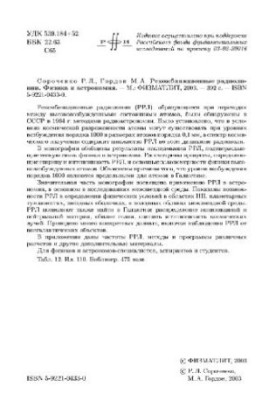Recombination Radio Lines: Physics and Astronomy
 Instant download
Instant download
after payment (24/7)
 Wide range of formats
Wide range of formats
(for all gadgets)
 Full book
Full book
(including for Apple and Android)
Recombination radio lines formed during transitions between highly excited states of atoms were discovered in the USSR in 1964 by methods of radio astronomy. It was found that in conditions of cosmic rarefaction, atoms can exist at excitation levels of the order of 1000 and atom sizes of the order of 0.1 mm, and the spectrum of cosmic radiation contains a plurality of radar in the entire range of radio waves. The monograph summarizes the results of the RRL study, confirming the close relationship between physics and astronomy. Processes determining the width and intensity of RRLs, and the main laws of physics of highly excited atoms are considered. Explained the reasons that excitation levels of the order of 1000 are the limit for atoms in the Galaxy Much of the monograph is devoted to the application of radar in astronomy, mainly in the research of the interstellar medium .. The possibilities of radar in determining physical conditions in HII regions, planetary nebulae, stellar shells, in cold clouds of interstellar medium are shown. The radar also allows us to find in the galaxy the distribution of ionized and neutral matter, the abundance of helium, to assess the intensity of cosmic rays. Many specific data are given, including radar observations from extragalactic objects. The application provides the frequency of radar, methods and programs of various calculations and other additional materials.
LF/848662544/R
Data sheet
- Name of the Author
- Гордон М.А.
Сороченко Р.Л. - Language
- Russian
- ISBN
- 9785922104333
- Release date
- 2003













